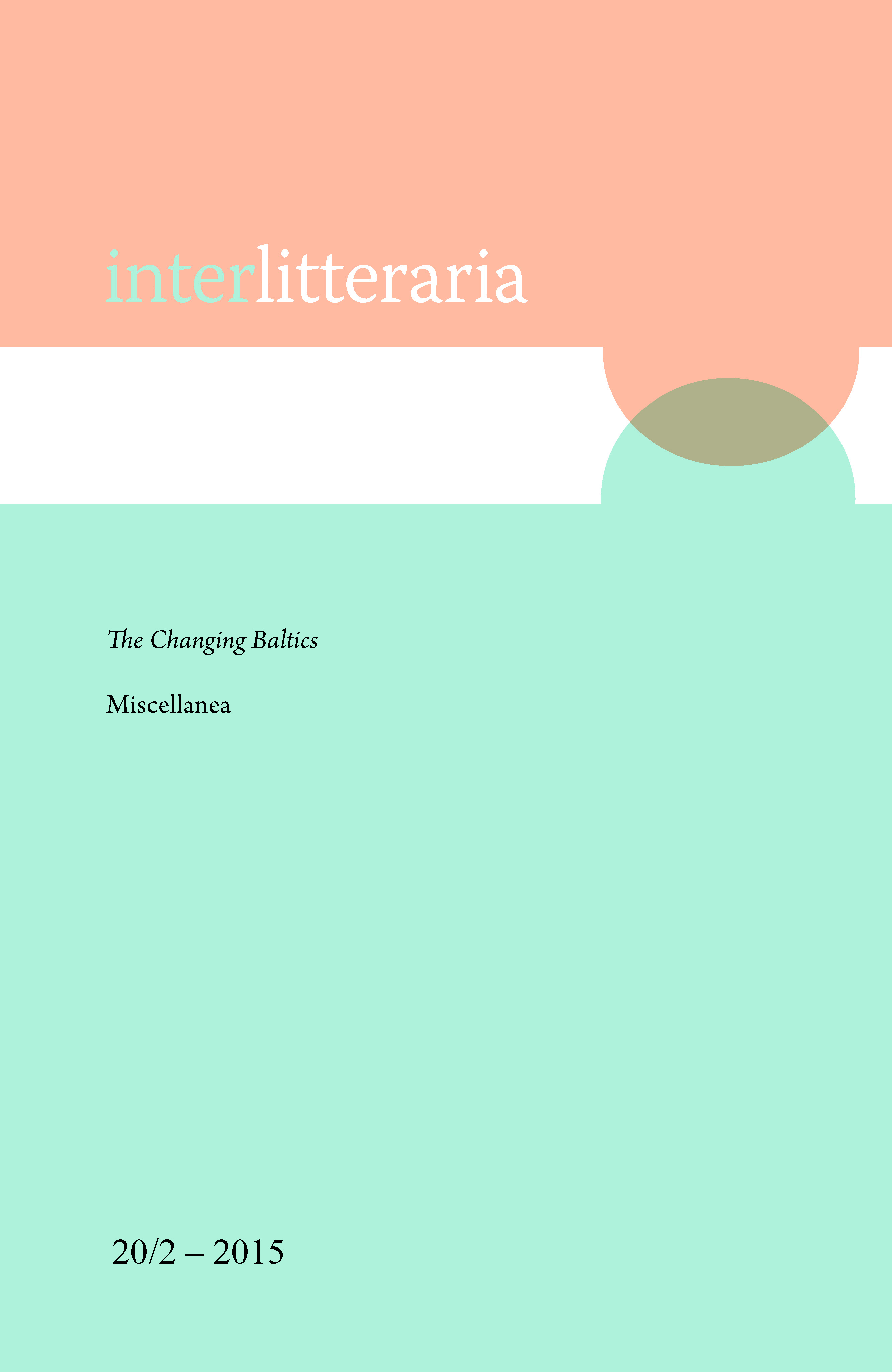Lithuanian Poetry in the Light of European Existentialism: Vincas Mykolaitis-Putinas
DOI:
https://doi.org/10.12697/IL.2015.20.2.5Keywords:
Lithuanian Poetry, philosophy, Existentialism, Vincas Mykolaitis-Putinas, free will, authentic being, fear, faithAbstract
The article concentrates on the perspectives of two disciplines – the Lithuanian literature and philosophy of Existentialism – and their specific manifestations as literature of existentialism, and aims to represent how the main questions of existence began to arise in Lithuanian poetry and later were spread at the theoretical level at the university in Kaunas. Vincas Mykolaitis-Putinas is the author whose works symbolically represent a turning point in Lithuanian literature. Finding himself in a difficult and ambiguous situation, having entered priesthood, the traditional education for peasant children, he had to break the ties with his past and gain status as an independent artist. The theme of choice, authentic life and questions of the human place in the universe found their poetic expression in the meditative poetry of Mykolaitis-Putinas. In the poetry of his last period, the theme of death becomes important and Heidegger’s concept “Being-toward-death” (“Sein zum Tode”) emerges as the last thrilling problem. Mykolaitis-Putinas had an impact on the younger generation of Lithuanian poets to whom existential problems were self-evident.Downloads
Download data is not yet available.
References
<div class="WordSection1"><p>Bergson, Henri, “The Two Sources of Morality and Religion”, <a href="https://archive.org/stream/twosourcesofmora033499mbp/twosourcesofmora033499mbp_djvu.txt">https://archive.org/stream/twosourcesofmora033499mbp/twosourcesofmora033499mbp_djvu.txt</a> (04.02.15)</p><p>Giddens, A. 2000. 1982. <em>Modernybė ir asmens tapatumas</em>. Vilnius: Pradai.</p><p>Gimbutas, M. 1982. <em>The Goddesses and Gods of Old Europe 6500-3500 B.C. Myths and Cult Images</em>. Berkeley and Los Angeles: University of California Press.</p><p>Hansen, W. 2001. <em>Ariadne’s</em><em> </em><em>Thread:</em><em> </em><em>A Guide to International Tales Found in Classical Literature</em>. Ithaca and London: Cornell University Press.</p><p>Heidegger, M. <em>What is Metaphysics? </em>Transl. Miles Groth. <a href="http://wagner.edu/psychology/files/2013/01/Heidegger-What-Is-Metaphysics-Translation-GROTH.pdf">http://wagner.edu/psychology/files/2013/01/Heidegger-What-Is-Metaphysics-Translation-GROTH.pdf</a> (04.02.15).</p><p>Heidegger, M. 1962. <em>Being and Time</em>. Transl. John Macquarrie & Edward Robinson. New York: Harper & Row.</p><p>Jaspers, K. G. 1954. <em>Way to Wisdom: An Introduction to Philosophy</em>. Transl. Ralph Manheim. New Haven and London: Yale University Press.</p><p>Kaufmann, W. 1980. <em>From Shakespeare to Existentialism</em>. Princeton: Princeton University Press.</p><p>Kierkegaard, S. Arba – arba. – <em>Filosofijos istorijos chrestomatija</em>. Vilnius: Mintis</p><p>Nietzsche, F. 1999. <em>Thus Spake Zarathustra by Friedrich Nietzsche</em>. Transl. Thomas Common. The Pennsylvania State University, <a href="http://www2.hn.psu.edu/faculty/jmanis/nietsche/tszarath.pdf">http://www2.hn.psu.edu/faculty/jmanis/nietsche/tszarath.pdf</a> (04.02.15).</p><p>Ricœur, P. 1976. <em>Interpretation</em><em> </em><em>Theory:</em><em> </em><em>Discourse</em><em> </em><em>and</em><em> </em><em>the</em><em> </em><em>Surplus</em><em> </em><em>of Meaning</em>. Fort Worth: Texas Christian Press.</p><p>Ricœur, P. 1981. <em>Hermeneuticsandthe</em><em> </em><em>Human</em><em> </em><em>Sciences</em>. J. B. Thompson, ed., Cambridge, UK: State University of New York Press.</p><p>Sartre, J.-P. 1943. <em>L’être et le néant</em>. Paris: Galimard.</p><p>Steiner, G. 1998. <em>Tikrosios esatys</em>. Vilnius: Aidai.</p><p>Sietynas, A. 1965. “The condition of a free prisoner: Poetry and Prose of Vincas Mykolaitis-Putinas”. – <em>Lituanus</em>, Volume 11, No.1, Spring 1965, Chicago, 48–64.</p></div><p>Surdokaitė, G. 2010. „Rūpintojėlis lietuvių tautosakoje ir liaudies skulptūroje: pagrindiniai sampratos aspektai“ [„Rūpintojėlis in Lithuanian Oral Folklore and Folk Sculpture: The Main Aspects of Conception”]. – <em>Tautosakos darbai </em>XL, 2010.</p><p>Šliogeris, A. 1981. S. Kierkegoras – egzistencinio mąstymo pradininkas. – <em>Egzistencijos filosofija: istorija ir dabartis</em>. Vilnius: Mintis, 19–50.</p>
Downloads
Published
2015-12-31
Issue
Section
Articles
License
The contents of Interlitteraria are published under CC BY-NC-ND licence.


